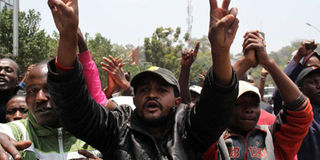Uncertainty caused by the coming poll will be settled in a free and fair election

Jubilee supporters outside Anniversary Towers, Nairobi, where Nasa supporters were protesting to call for the removal of Independent Electoral and Boundaries Commission (IEBC) officials on September 26, 2017 . PHOTO | EVANS HABIL | NATION MEDIA GROUP
What you need to know:
- Benevolent dictators justify their authoritarian rule by pointing to successes they have achieved for their subjects.
- A country is unstable if its politics is characterised by upheaval brought about by dissension, strikes, assassinations and demonstrations.
- Jubilee hawks must remember Kenya’s economy remains the biggest in East Africa and its stability the envy of the region long after Kanu’s constitutional dictatorship was ended.
Jubilee Party hawk David Murathe declares that what Kenya “needs now is a benevolent dictator”. “People have been too soft so that things (sic) have gone rogue”, he moans. While Uganda and Rwanda are “very stable”, Mr Murathe laments that here somebody can demand that unless certain things are done his way, there will be no election.
Mr Murathe has supporters, especially among the Jubilee top brass and diehard backers. Benevolent dictators justify their authoritarian rule by pointing to successes they have achieved for their subjects.
They argue that hungry people need food and not a bill of rights and vouch for a subservient populace and not an agitating opposition or civil society.
Indeed, it is argued that Singapore would not have become the great city state it is today if its founding father, Lee Kuan Yew, had not been ruthlessly dictatorial in pursuit of economic prosperity at the expense of civil liberties. He is credited for suppressing such liberties and opposition in order that Singapore may have political stability and achieve economic prosperity.
GENOCIDE
Jubilee hawks are implying that it is in order for Kigali to imprison Ms Victoria Ingabire for questioning why there were no memorials for the Hutu who died in 1994, because such a position amounted to denying there was genocide in Rwanda. The hawks are also saying harassing of even token opposition anchors Kigali’s stability.
They are suggesting that Uganda, too, is stable because Kampala perpetually harasses and brutalises Dr Kizza Besigye and any organised opposition. Sadly, the upshot of these pronouncements is an invite to President Kenyatta to borrow from Kigali and suppress opponents to make Kenya stable.
What is political stability? If a country changes its government often and especially if triggered by disruption in the governing party, such lack of steadiness or firmness constitutes instability.
Second, a country is unstable if its politics is characterised by upheaval brought about by dissension, strikes, assassinations and demonstrations.
UNSTABLE
And a country is unstable if its laws or policies, especially those affecting important sectors such as agriculture, natural resources, land and investment, for example, are changed frequently as to cause widespread disruption. So is Mr Murathe right to characterise Kenya as unstable? Should Nairobi limit opposition?
Mr Murathe & Co are profoundly wrong. Kenya is experiencing uncertainty right now. But this is a quinquennial test brought about by elections. Every year after a General Election, Kenya’s economy grows significantly, but every fifth year, it goes south because of rising political temperatures as Kenyans prepare for the next General Election.
This year is slightly different. The fierce competition leading up to the August 8 General Election ended up in the Supreme Court where President Kenyatta’s victory declared on August 11 was annulled and a repeat presidential poll ordered.
The electioneering was extended; the temperatures rose higher; and the President poisoned the campaign by attacking the court for finding for Mr Odinga.
OVERHAULED
Mr Odinga upped the ante, declaring he would not take part in the re-run unless the polls umpire was overhauled and, worse, he asserted that if his National Super Alliance was not going to vote, they would make sure that Jubilee would not vote either. Mr Odinga has not caused instability, but he certainly has caused uncertainty aplenty.
He poses a political challenge which Jubilee must overcome politically. President Kenyatta has caused uncertainty but not instability by going toxic in his foul-mouthed campaign against the Supreme Court. However, the challenge of uncertainty caused by the coming poll will be settled in a free and fair election, refereed by an impartial umpire and not by despotism.
STABLE ECONOMY
That is what Kenya needs and not laws to tilt the playing field in the President’s favour. Indeed, before President Kenyatta honours Mr Murathe’s invite or welcomes new laws, he should remember this: If you are making a weapon to use against your enemy, always stop to think what the enemy would do to you when they laid their hands on it.
Two, Jubilee hawks must remember Kenya’s economy remains the biggest in East Africa and its stability the envy of the region long after Kanu’s constitutional dictatorship was ended.
Kenyans would not have fought Kanu’s monopoly of power if dictatorship was a godsend or benevolent
Last, if President Kenyatta wins on October 26, Jubilee’s crushing majority in the twin Houses of Parliament will guarantee smooth passage of his agenda no matter how unpopular. That’s legislative dictatorship which gives the majority party monstrous power.
Opanga is a commentator with a bias for politics [email protected]





